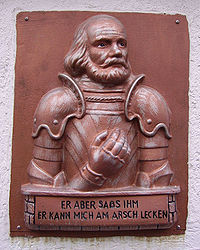
Götz von Berlichingen (Goethe)
Encyclopedia

Johann Wolfgang von Goethe
Johann Wolfgang von Goethe was a German writer, pictorial artist, biologist, theoretical physicist, and polymath. He is considered the supreme genius of modern German literature. His works span the fields of poetry, drama, prose, philosophy, and science. His Faust has been called the greatest long...
, based on the memoirs of the historical adventurer-poet Götz von Berlichingen
Götz von Berlichingen
Gottfried "Götz" von Berlichingen and also known as Götz of the Iron Hand, was a German Imperial Knight and mercenary....
(ca. 1480–1562). The plot has various changes to Götz's real biography. Goethe's Goetz dies young, while the historical Götz died an octogenarian.
Goetz is a free spirit, a maverick, intended to be a pillar of national integrity against a deceitful and over-refined society, and the way in which he tragically succumbs to the abstract concepts of law and justice shows the submission of the individual in that society.
Goetz von Berlichingen was one of Goethe's early successes but its large cast size, frequent quick scene changes, and long running time caused the original version to eventually fall out of favour. The play was re-arranged and cut several times, sometimes by Goethe himself, in order to suit various venues and theatre companies.
Famous quote
The first version of the drama included a quote that gained fame fast. In the third act, Goetz is under siege by the Imperial Army in his castle at JagsthausenJagsthausen
Jagsthausen is a town in the district of Heilbronn in Baden-Württemberg in Germany....
. The captain of the army asked him to surrender; from a window, he gives his answer:
It can be translated as:
Goethe based this passage on the autobiography
Autobiography
An autobiography is a book about the life of a person, written by that person.-Origin of the term:...
of the historical Götz, who records himself as saying (in a different context) "er solte mich hinden lecken" ("He can lick me on the behind").
The "he can lick me in the arse" quote became known euphemistically as the Götz quote.
Only the editions of 1773 and 1774 had the full quote. After that, in both printed editions and performances of the play, it was long common practice to tuncate the quote to "er kann mich —".
Mozart in 1782 wrote two canons
Canon (music)
In music, a canon is a contrapuntal composition that employs a melody with one or more imitations of the melody played after a given duration . The initial melody is called the leader , while the imitative melody, which is played in a different voice, is called the follower...
inspired by it, Leck mich im Arsch
Leck mich im Arsch
Leck mich im Arsch is a canon in B-flat major composed by Wolfgang Amadeus Mozart, K. 231 , with lyrics in German. It was one of a set of at least six canons probably written in Vienna in 1782...
and Leck mir den Arsch fein recht schön sauber
Leck mir den Arsch fein recht schön sauber
Leck mir den Arsch fein recht schön sauber is a canon for three voices in B-flat major, K. 233/382d, long thought to have been composed by Wolfgang Amadeus Mozart during 1782 in Vienna.-Authenticity:...
.

